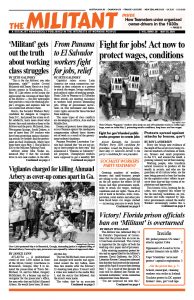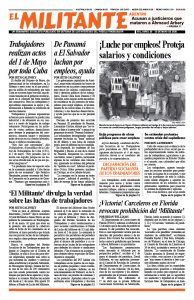May 29, 1995
Hundreds of thousands of workers across South Africa joined demonstrations during a national day of mourning May 17 to commemorate the May 10 disaster at Anglo-American Corp.’s Vaal Reefs mine, in which 105 gold miners were killed. Working people held mass rallies in eight regions of South Africa.
“This was a turning point in the transformation of South Africa — and it was written in the blood of the workers,” said Pat Matosa, a former miner and provincial chairperson of the African National Congress. “This was a terrible tragedy. But it has introduced a huge space to fight for change.”
The accident occurred as workers were descending the 7,000-foot shaft on their way to work. A 12-ton locomotive and a mine car fell down the shaft, causing the cage to fall more than 1,500 feet to the mine floor. Moments later the train crashed down on top of the cage.
May 26, 1970
JACKSON, Miss., May 17 — Two unarmed Black students were shot to death here by state troopers and city police May 15. Fourteen others were wounded. The murders came on the second night of antiwar demonstrations at Jackson State. The dead were Philip L. Gibbs and James Earl Green. Gibbs was shot in the head. Green was shot in the back.
“They were trying to kill,” says James Meate, 19. “And they did kill. It was nothing but a massacre. They killed two and kept trying to kill more.”
Jackson State was closed for the remainder of the school year. But angry students, with community support, held a memorial service for the slain victims. More than 1,000 persons marched to the campus.
Charles Evers, mayor of Fayette, labeled it “outright murder.” He said the president, the vice president and the governor must be held responsible.
May 26, 1945
Twentieth century barbarism tightened its rule over Europe this week as the Allied conquerors began imposing their “peace” on Germany in accordance with the secret agreements of the Yalta conference. It is an ugly, sinister “peace,” sentencing tens of millions of workers and poor people to slavery, starvation and death. Outright “annexation” of portions of Germany was agreed upon.
The “iron control” of the Allies sounds more brutal than that imposed by the Nazis on occupied countries. All entertainment is outlawed. Postal circulation is forbidden. Use of telephones is banned. The curfew is enforced. Travel is prohibited by any means except foot and bicycle. Shops outside those who handle food remain closed.
Allied policy in Germany is clearly aimed to suppress any revolutionary tendencies of the German workers.

